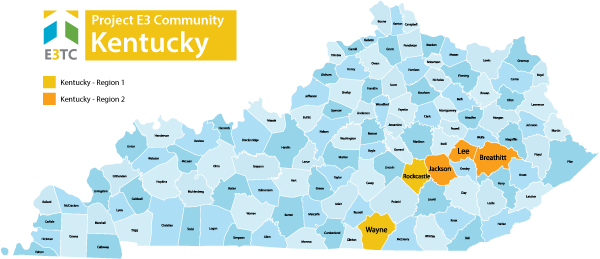Kentucky was chosen as a targeted community through the Vocational Rehabilitation Technical Assistance Center: Targeted Communities (VR-TAC-TC) or Project E3. Project E3 partnered with State VR Agencies and local community partners to improve outreach and employment-related services to underserved people with disabilities in these communities.
 Kentucky is known as the "Bluegrass State", a nickname based on the blue grass found in its many areas of rich, fertile soil. It offers diverse environments and abundant resources, and is known for horse racing, bourbon distilleries, coal mining, tobacco, and bluegrass music, among other things.
Kentucky is known as the "Bluegrass State", a nickname based on the blue grass found in its many areas of rich, fertile soil. It offers diverse environments and abundant resources, and is known for horse racing, bourbon distilleries, coal mining, tobacco, and bluegrass music, among other things.
Kentucky is a primarily rural state, incorporating 54 Appalachian counties, and characterized by a high poverty rate relative to other U.S. states. The geographic isolation of Kentucky’s rural communities poses significant challenges for persons with disabilities in achieving competitive, integrated, and lasting employment, and community participation and integration.
The rural nature of Kentucky and the centralization of employment opportunities in urban areas create significant transportation and access barriers to employment opportunities.
Targeted Communities
The state-federal vocational rehabilitation system in Kentucky faced many challenges as it strove to serve people with significant disabilities and promote competitive integrated employment. Project E3 provided intensive technical assistance to two geographically distinct regions of the state:

Key Information
Rural Population
National average = 6.3%
The rate of disability among non-institutionalized working-age people is second highest in nation.
Median Income
People with disabilities = $30,200
People without disabilities = $53,700
difference in income levels
SSI
Education
People with disabilities
with Bachelor's degree or higher = 9.7%
People without disabilities
with Bachelor's degree or higher = 26.2%
Poverty Rate
Poverty in Appalachia is extreme and qualitatively different from other rural areas of the United States.
Targeted Populations
Within the targeted communities, Project E3 focused on improving vocational rehabilitation service outcomes for these populations:
Primary Challenges for Targeted Populations
The combination of the challenges above and other factors created significant barriers for persons with disabilities living in Kentucky, including access to and opportunities for:
Key Strategies to Address Barriers
Following are some of the key strategies developed and implemented to address the targeted populations' challenges and barriers to employment.
Community Based Participatory Research (CBPR): To understand a community’s issues and concerns, one needs data and information both supplied by common data sources and interpreted by the community to better understand their issues and possible solutions to those issues. CBPR’s methodology is predicated on deep and extensive community involvement in the identification of issues and concerns and in the resolution of those issues and concern.
Community Outreach and Orientation: The goal of community outreach and orientation is increased referrals for vocational rehabilitation services from community-based organizations and applications from people with disabilities. To achieve this goal, developing relationships within local communities is essential. Community outreach and building knowledge about the hiring people with disabilities is key.
Transportation: Transportation is regularly cited as the number one barrier for persons with disabilities. Kentucky developed a series of transportation modules and successful practices which help address the issue. The modules can be replicated and tailored for other states and jurisdictions.
Customized Employment: Identifying the specific interests of persons with disability living in poverty and then matching them to employment can be a barrier to finding employment for some individuals. Kentucky developed the Customized Employment Manual and distributed the manual to Kentucky VR, community based organizations and other stakeholders as a training tool to gain the skills of Customized Employment.
Community Outreach and Orientation: Community buy-in and support needs constant attention as community members change and new members are added. UK-HDI has actively engaged VR and community partners this quarter through extensive direct transportation technical assistance with the Development Disabilities Council, State/Local Coalitions, Protection & Advocacy Agency (P&A), and Consumer/Advocacy Organizations and other groups in both Kentucky TCs.
Individual Placement and Support: An evidenced-based practice which expedites the employment of persons with disabilities especially persons suffering from mental illness while providing counseling and guidance during the employment search. Kentucky ensured continuation after the end of the grant by with multiple TA activities and trainings in both TCs, including community mental health agency supervisor meetings and trainings, meetings with VR Counselors to review IPS principles, fidelity and strategies for collaboration, and community/professional employment trainings with over 50 VR and Mental Health/Substance Abuse Agency participants.
Kentucky Overview PowerPoint Presentation
Project Outcomes
Project E3 provided Kentucky’s state Vocational Rehabilitation agencies and their partners with the skills and competencies needed to effectively and efficiently address barriers to competitive integrated employment and community integration encountered by persons with disabilities in these regions.
We will leverage promising practices, knowledge, and experience gained from this project to expand employment opportunities for individuals with disabilities from underserved and economically disadvantaged populations throughout Kentucky and across the United States.
Sustainability and Continuity Plan
Tools and Resources
Transportation
Transition
- Transition 101: What we all need to know about Transition for Students with Significant Disabilities
- Transition 102: Important Predictors for Post-School Success
- View all Kentucky Transition and Supported Employment Learning Modules
Benefits
Assistive Technology
More Information
For further information about the Kentucky community activities - visit their project webpage or contact:

Christina Espinosa Bard, MRC, CRC
Director, Community Education
Human Development Institute
Ctespinosa@uky.edu


